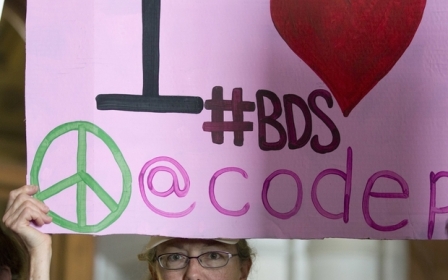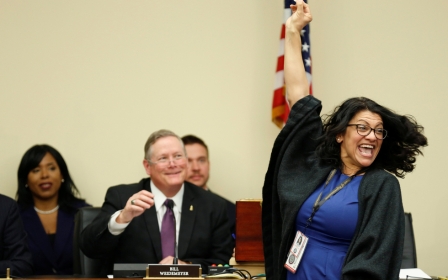US opposition grows to Senate measure that would criminalise Israel boycott

WASHINGTON DC - Key Democratic senators and civil rights groups have voiced their opposition to a proposed measure in Congress that would prohibit US companies from boycotting Israel, saying that it violates freedom of speech.
Senator Bernie Sanders and senior Democrat Dianne Feinstein issued a letter on Wednesday asking top lawmakers from both major parties to block the provision, known as the Israel Anti-Boycott Act.
"While we do not support the Boycott, Divestment and Sanctions (BDS) movement, we remain resolved to our constitutional oath to defend the right of every American to express their views peacefully without fear of or actual punishment by the government," the letter said.
The proposed measure, which is attached to a broader spending bill in the Senate, calls for imposing fines on businesses that answer the call of "international governmental organisations" to boycott Israel.
It cites a supposed plan by the UN Human Rights Council to create a "blacklist" of Israeli companies based in the occupied West Bank, including East Jerusalem, effectively extending the punishment to companies that boycott illegal Israeli settlements.
The spending bill must pass before the end of the week to avoid a partial government shutdown.
'Full-scale attack'
The New York Times editorial board slammed the proposal, calling it "part of a widening attempt to silence one side of the debate" on the Israeli-Palestinian conflict.
"[Palestinians] are criticized when they resort to violence, and rightly so. Should they be deprived of nonviolent economic protest as well? The United States frequently employs sanctions as a political tool, including against North Korea, Iran and Russia," the board said in an editorial published on Tuesday.
The American Civil Liberties Union (ACLU) called the measure a "full-scale attack on Americans’ First Amendment freedoms," while J Street, a pro-Israel Jewish group committed to the two-state solution, called it "dangerous".
"Treating Israel and the settlements as the same under US law would make a two-state solution and peace in the Middle East harder to achieve," J Street said in a petition to lawmakers.
Free speech advocacy groups in the US have expressed growing concerns over a recent push to criminalise the boycott of Israel both at the state and federal levels, which the organisations say is part of a wider effort to combat the BDS movement.
Launched by 170 Palestinian civil society groups in 2005, the BDS movement seeks to pressure Israel to end its occupation of the Palestinian territories, ensure equal rights for Palestinian citizens of the state, and allow the return of Palestinian refugees.
On Monday, an educator in Texas filed a lawsuit against the state because she was unable to renew her contract with a public school after refusing to sign a pledge that she does not boycott Israel.
Earlier this year, similar lawsuits in the US states of Kansas and Arizona succeeded in suspending anti-boycott laws after they were deemed unconstitutional.
"A restriction of one’s ability to participate in collective calls to oppose Israel unquestionably burdens the protected expression of companies wishing to engage in such a boycott," a federal judge in Arizona ruled in September.
On Wednesday, senators Sanders and Feinstein referred to those court cases as they argued that the anti-boycott measure in Congress was unconstitutional.
As Israeli Prime Minister Benjamin Netanyahu's government "is pursuing policies clearly aimed at foreclosing the two-state solution, it is deeply disappointing that Congress would consider choosing to penalise criticism of those policies," they wrote.
New MEE newsletter: Jerusalem Dispatch
Sign up to get the latest insights and analysis on Israel-Palestine, alongside Turkey Unpacked and other MEE newsletters
Middle East Eye delivers independent and unrivalled coverage and analysis of the Middle East, North Africa and beyond. To learn more about republishing this content and the associated fees, please fill out this form. More about MEE can be found here.




